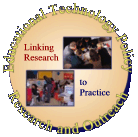| Free Online Courses |
| Title |
Description |
| Andrological and Pedagogical Training Differences
for Online Instructors |
Article addresses the question: Can faculty
make effective use of the online platform to design, construct
and deliver a meaningful online course that addresses the
motivations, needs, learning styles and constraints of nontraditional
learners, while achieving the same learning outcomes as
onground? Archived PDF |
| Blogging
to Disseminate Best Online Learning Practices and Technology
News |
Examines Blogging to disseminate best practices.
Archived PDF |
| Considerations for Developing Evaluations
of Online Courses |
This study categorizes principles gathered
from an extensive review of the literature focusing on current
best practices for effective teaching and learning in online
courses. Archived PDF |
| A Constructivist Approach to Online Training
for Online Teachers |
Article examines the pedagogical role of
the teacher in online education. Archived PDF |
| Distance Learning Systems Tips |
Archive of individual Teaching Tips |
| Journal of Interactive and Online Learning |
The Journal of Interactive Online Learning
focuses on providing a venue for manuscripts, critical essays,
and reviews that encompass disciplinary and interdisciplinary
perspectives in regards to issues related to higher-level learning
outcomes. |
| The Post-Secondary Networked Classroom: Renewal of Teaching
Practices and Social Interaction |
This article presents the teaching practices of post-secondary
educators who integrated asynchronous electronic conferencing
in over one hundred mixed-mode courses at eight North American
institutions between 1996 and 1999. Archived PDF |
| Research-Supported Best Practices for Developing Online Learning |
An analysis was conducted of the body of research studies
on best practice in asynchronous or
synchronous online instruction in higher education. Archived
PDF |
| The Sloan Consortium Report to the Nation:
Five Pillars of Quality Online Education |
The Alfred P. Sloan Foundation’s
Sloan Consortium (Sloan-C) established its Five Pillars
for Quality Online Education – learning effectiveness,
student satisfaction, faculty satisfaction, cost effectiveness,
and access – as the values, principles and goals of
asynchronous learning networks. Archived PDF |




















